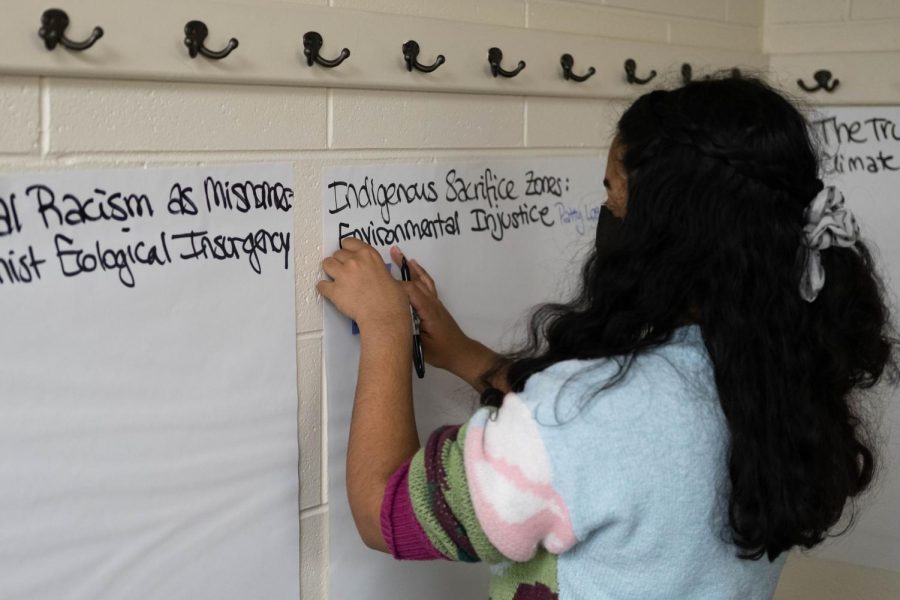‘Generations of Environmental Justice’ provides all-night climate education and builds community
Seeger Gray/The Daily Northwestern
At “Generations of Environmental Justice,” students and Evanston residents engaged in all-night programming centered around environmental justice.
April 24, 2022
Northwestern students and Evanston residents filed into Alice Millar Chapel on Friday evening for an all-night Earth Day event filled with speakers, workshops and live music.
The student-led event, “Generations of Environmental Justice,” was inspired by the 1970 “Project Survival,” a NU student-led teach-out organized before the first Earth Day.
Anthropology Prof. Melissa Rosenzweig, who originally devised the theme, said she initially pictured the event as an opportunity for attendees to meet and connect with older environmental activists. However, they said student organizers planned and developed their own vision.
“I’m so proud of the students who put this together because they were bold, they were conscientious and they put together a program that I never could have conceived,” Rosenzweig said. “They wanted to get away from the idea of individual leadership and more around people power and community action.”
Communication junior Lucy London, a lead organizer of the event and member of Fossil Free NU, said while “Project Survival” only featured white male speakers, they wanted “Generations of Environmental Justice” to center Black and Indigenous people’s work.
“We aim to center Black and Indigenous people and people of color in workshops at this event, because poor Black, brown and Indigenous people bear the brunt of environmental injustice, and therefore are at the heart of resistance and movement strategy,” London said in their introduction speech.
Running from 5 p.m. to 7 a.m., programming began at the chapel and Parkes Hall after opening speeches from organizers. Several programs ran each hour until 11 p.m., including talks from professors, activists and environmental justice organizations.
In her lecture “Indigenous Sacrifice Zones: Environmental Justice,” Medill Prof. Patty Loew discussed examples of economic development disproportionately impacting Indigenous communities, including the Enbridge Line 3 and Line 5 oil pipeline projects.
Loew, a citizen of the Bad River Band of Lake Superior Ojibwe, said she was excited to speak to attendees about her tribe’s fight against Line 5. She added non-Indigenous supporters are important to the community’s advocacy efforts because Native Americans are less than 3% of the U.S.’s population.
“A lot of times, we identify problems, and we wring our hands and say, ‘Oh yeah, that’s really bad,’” Loew said. “But I hope that attendees get some solutions out of my presentation because I talk about the legal tools that Indigenous people have to protect their natural and cultural landscapes.”
Evanston Township High School senior Lily Aaron, an Etown Sunrise coordinator, presented with other members on Etown Sunrise’s progress and plans for the future. Aaron and the other leaders also initiated discussion on how Etown Sunrise and NU could collaborate.
“For so long, there’s been a bit of a disconnect between the two of us, and we, at our core, are both trying to hold these institutions accountable,” Aaron said. “We both have a whole lot of energy and if we mobilize together we can really get it done.”
The event included breaks for free time and food at 7 p.m. and 11 p.m., during which musicians Moyana Olivia and the Debbie-Marie Brown Band performed.
Weinberg freshman Ishika Arora, one of the event’s lead organizers and a Fossil Free member, said food for the event was sourced from sustainable or local organizations and provided alongside compostable dishes and utensils.
“This event is about environmental justice and making sure that we’re upholding the values that we want to talk about,” Arora said.
Activist Jessy Bradish hosted a visioning session at midnight to help attendees create actionable plans based on material they learned from the event.
“Hopefully, it’ll model for us that this is the way we can all work together in leader-full, non-hierarchical movements,” Bradish said.
After midnight, programming included a collaging space, environmental justice movies and a strategy session with Fossil Free NU and the Red Pine Revolutionary Collective.
Weinberg junior Isaiah Tolbert, who was also a volunteer, said the night helped him bond with other students in a way he hadn’t before.
“It really connected me more with the people who are already working on the same goals, just in different ways,” Tolbert said. “I probably wouldn’t be here waiting for the Fossil Free Northwestern meeting if I had not gone to that first.”
The program concluded with a gathering to reflect on the night while watching the sunrise over the Lakefill. London said it was a “magical” experience.
“That was when we realized how good it felt to be in community together,” London said, “and have the space to grieve about all that is happening and all that is wrong with our world and actually resolve to put action and energy towards it.”
Email: carolinebrew2024@u.northwestern.edu
Twitter: @carolinelbrew
Email: rjleung7@u.northwestern.edu
Twitter: @rjleung7
Related Stories:
— Climate activist and policy expert Ayana Johnson kicks off Global Engagement Summit
— ETHS student activists lead first Climate Justice Conference
— EPL’s “All We Can Save” book group highlights intersectionality between feminism and climate change


